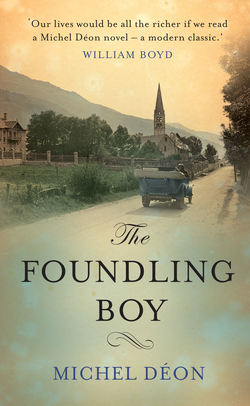Читать книгу The Foundling Boy - Michel Deon - Страница 8
На сайте Литреса книга снята с продажи.
4
ОглавлениеAbout fifty people had crowded onto the pavement facing the offices of La Vigie: pensioners with their caps on straight, young workers with theirs jauntily over their ears, children. No women. But many bicycles stood next to their owners, one in particular, that of Jean Arnaud, red and with derailleur gears and racing handlebars taped up with gutta-percha. Whenever an employee emerged through the glass door and placed his ladder against the wall beneath the blackboard above the exhibition area, there was an ‘ahh’ of satisfaction from the waiting crowd. Calmly, in a round, well-turned hand, the man wrote in chalk ‘Stage: Nice–Gap. 1st André Leducq, 2nd Bonduel, 3rd Benoît Faure’. In the overall placings, of course, Leducq had retained the yellow jersey. The crowd dispersed, disappointed, almost without comment. Reawakened in 1930 by the return to a system of national teams, French chauvinism was bored by a victory that lacked drama. That André Leducq, a great sprinter but lamentable climber, should have won a mountain stage proved that, unless the dice were loaded, it was all over. The 1932 Tour, in stark contrast to the previous year, when there had been victory for the great Antonin Magne combined with a heroic sacrifice by his young team-mate René Vietto on the Col du Lautaret, would finish in tedium. Jean got on his bike and set off for Grangeville, this time climbing the hill without standing up on his pedals. He had been feeling on top form since the beginning of the Tour, and his bike, a Peugeot, was worthy of a champion. He had bought it at Easter with his savings, supplemented by two postal orders from the mysterious prince. Nearly thirteen years old, he looked sixteen or seventeen; he was five foot seven, with long legs and a well-developed upper body. Jeanne now bought his clothes at the men’s department in the Nouvelles Galeries. The term before, he had liberated himself from Madame du Courseau’s yoke by starting to ride to school at Dieppe, refusing a lift with Michel in her new Ford V8, still rather high-bodied and old-fashioned, but powerful and silent. He preferred his bike, however steep the hill back up to Grangeville. His height earned him the frequent (cautious) mockery of his schoolfriends, who themselves wisely remained below average in that respect. Jean stood up to their meanness without pleasure. He recognised Michel’s sly handiwork in these skirmishes: in the year above Jean, he was the one anonymously orchestrating the taunts and rallying cries. Less innocent now, Jean began to keep a tally. One day he would put an end to Michel’s campaign. His fists itched, but for now Michel continued to enjoy the aura of his family. He was the brother of the delicious Antoinette, with whom Jean’s excitements were becoming more and more specific. He was also the son of Antoine du Courseau, with whom he, Jean, had made a secret pact that was still in force, despite Antoine’s frequent absences. And he would have wounded his parents deeply by attacking one of the du Courseaus who, despite their accumulating difficulties, retained a certain magnificence for Jeanne and Albert.
